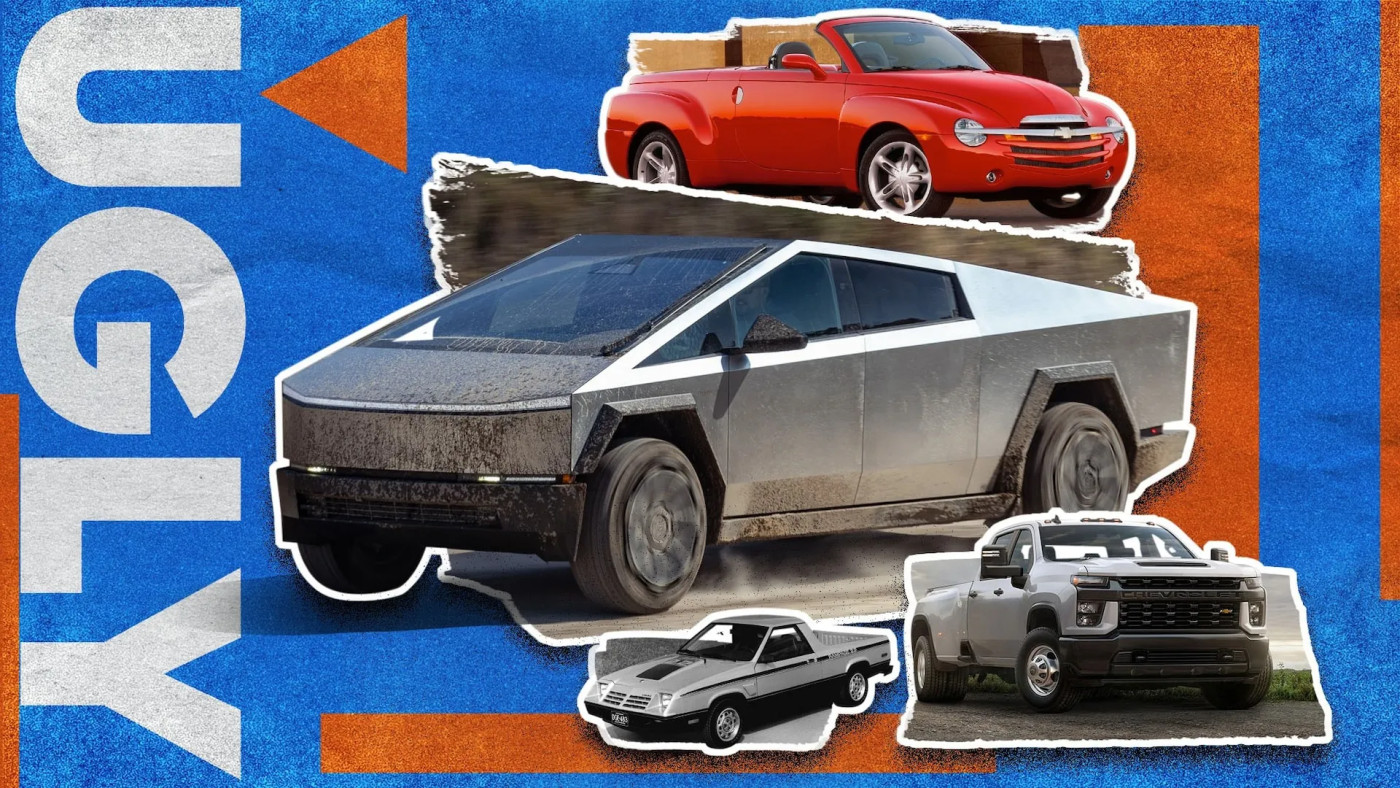
The top 12 ugliest pickup trucks ever made

A pickup truck is, by nature, a utilitarian design. So it’s somewhat more difficult to make it stylish than, say, a sensual and curvaceous sports car or a grand old Mercedes 600. That said, there’s no reason a truck must be outright ugly. Someone should have told the designers of this rotten dozen. They represent all sorts of manufacturers, weight classes and eras, and some of them are interesting or useful. But they all have one thing in common — these are some of the ugliest trucks ever built.
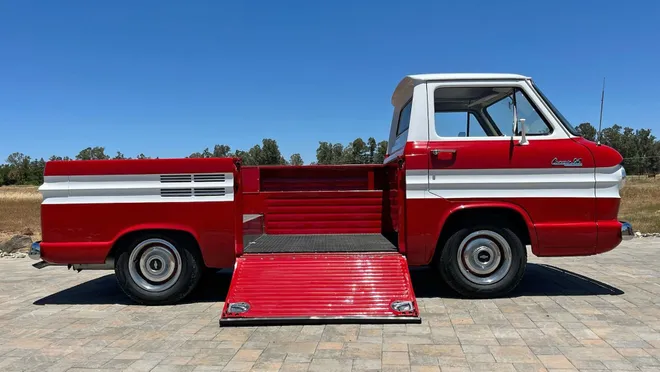
1961-1965 Chevrolet Corvair Truck 'Greenbrier'
Based on the rear-engined Chevrolet Corvair compact car, the Corvair 95 came in a few different versions: the cargo-oriented Corvan, Greenbrier passenger wagon and the simply named Truck. Regardless of body, they all had a proboscis of a nose that was begging for some rhinoplasty, as well as a rear-mounted, air-cooled flat-six that made the bed floor too high. To its credit, the Corvair Truck did offer a “rampside” option that allowed the bed walls to fold down to the ground, which made loading motorcycles and other cargo easier.
- Years Built: 1961–1965
- Why It’s Cool: Air-cooled, rear-mounted flat-six engine
- Why It’s Not: Porcine nose, stepped bed floor
- Value Today: $10,000–$30,000
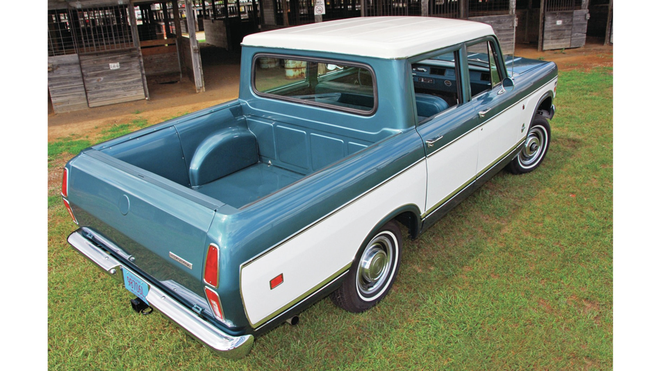
International Harvester Travelall Wagonmaster
For being one of the lesser-known pickup truck manufacturers in history, International Harvester was innovative. One of its best ideas was the Travelette pickup, which was the first crew cab truck with a full-size bed. One of its worst was the Wagonmaster, which was a version of the Travelall full-size SUV with the cargo area sheetmetal lopped off. The roofline was very obviously clipped off with little regard to restyling, and since the bed was integrated into the body, it was too short and narrow to be very useful.
- Years Built: 1973–1974
- Why It’s Cool: Unique unitized body
- Why It’s Not: Ugly unitized body
- Value Today: $15,000–$40,000
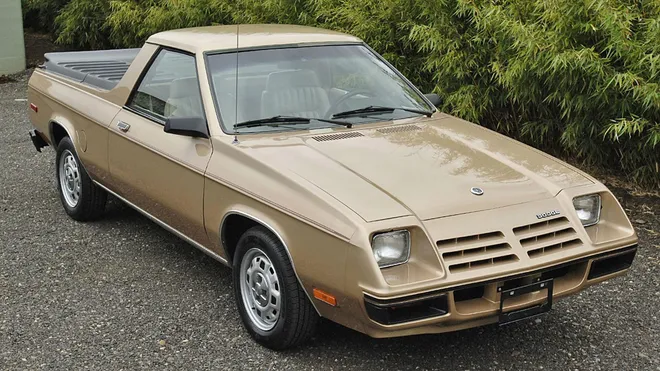
Dodge Rampage/Plymouth Scamp
The Dodge Rampage and Plymouth Scamp, sold from 1982 to 1984, were Chrysler Corporation’s attempt to build an answer to the Chevrolet El Camino. Unlike the larger GM ute, the Rampage and Scamp were based on the same compact car chassis as the Dodge Omni and Plymouth Horizon. Impressively, the Pentastars could haul 1,145 pounds of stuff in the bed, although with only 84 hp on hand from the carbureted 2.2-liter four-cylinder, the performance (or lack thereof) completely lived up to the homely styling.
- Years Built: 1982–1984
- Why It’s Cool: Compact-car efficiency, half-ton payload
- Why It’s Not: Dopey styling, lethargic powertrain
- Value Today: $3,000–$6,000
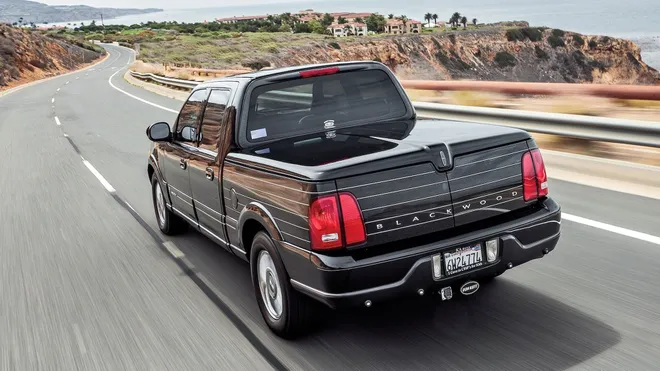
Lincoln Blackwood
The first-generation Lincoln Navigator was an astounding success, so it makes sense that Ford’s luxury brand would want to strike while the iron was hot on another utilitarian vehicle. Unfortunately, Lincoln’s second go-round, the F-150-based Blackwood, wasn’t quite so fortunate. The light-duty crew cab body style was a good idea, but the Blackwood came with rear drive only, and its carpeted cargo area, hidden behind Dutch doors and under a power-operated tonneau cover, was barely larger than the trunk of the Town Car sedan. The lowered Blackwood had odd proportions, and the faux African wenge wood paneling on the cargo box was a bit too esoteric for mainstream approval.
Lincoln only sold about 3,400 Blackwoods, a 10th of the Navigator’s average yearly production. The ugly-duckling luxe truck was so unpopular that although production ended in 2002, there were brand-new Blackwoods on dealer lots two years later. Still, the Blackwood has its fans nowadays.
- Years Built: 2002
- Why It’s Cool: Luxurious cabin, wood-tone bed paneling
- Why It’s Not: Carpeted cargo area, toilet-shaped center console
- Value Today: $3,000–$6,000
Pickup power:The 15 quickest pickup trucks MotorTrend has ever tested
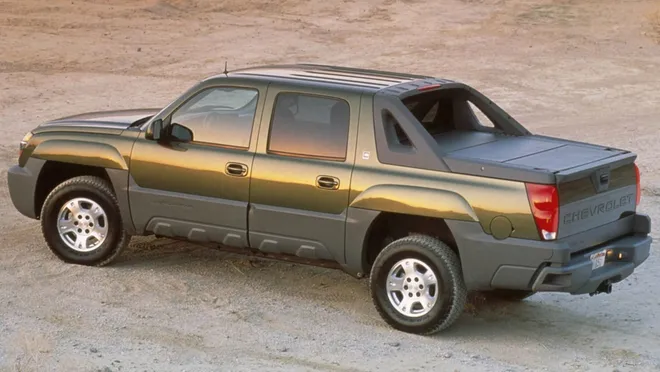
Chevrolet Avalanche
Chevrolet attempted to revive the International Wagonmaster’s chopped-SUV formula with the first-generation Avalanche, based on the same chassis as the Suburban. Introduced for the 2002 model year, the Chevy Avalanche improved on the old Travelall with a folding bulkhead between the passenger cabin and cargo bed called the “midgate.” Unfortunately, the versatile Avalanche took styling advice from the Aztek, with chunky black plastic cladding and an aggressive face that made the Chevy ute look like it was trying too hard. The 2007 second-generation model was far handsomer.
- Years Built: 2002–2006
- Why It’s Cool: Midgate that extended the bed floor into the passenger cabin
- Why It’s Not: Uh, just look at it
- Value Today: $8,000–$20,000
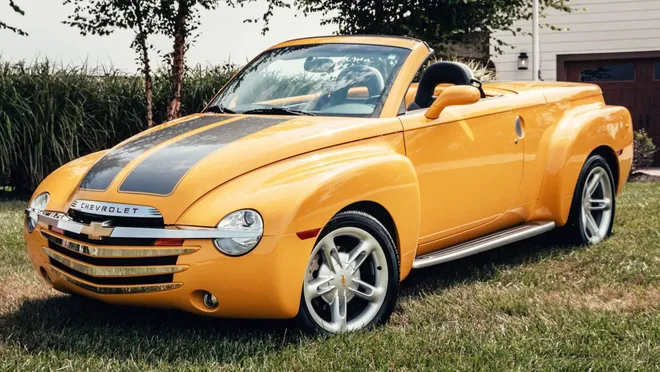
Chevrolet SSR
The Chevrolet SSR — which stands for Super Sport Roadster — was the Bow Tie’s first attempt at the retro craze surrounding the turn of the millennium. The styling evoked the Chevy Advance Design pickup that came out in 1947, although the SSR was meant to be a sportster, not a workhorse. This was evidenced by its power-operating hard top that turned the Chevy into a convertible at the touch of a button.
But while the hot rod pickups of the 1950s and 1960s were often chopped and lowered and hunkered down, the SSR rode too high, and its tall bodysides made it look swollen and ungainly. Add to that a wheezy, dull powertrain, and you have a recipe for failure. Chevy at least remedied that last point with an optional 6.0-liter V-8 and six-speed manual transmission that gave the SSR some go to match its show.
- Years Built: 2003–2006
- Why It’s Cool: Hot rod looks, retractable hardtop
- Why It’s Not: Expensive, heavy, not very sporty
- Value Today: $20,000–$35,000
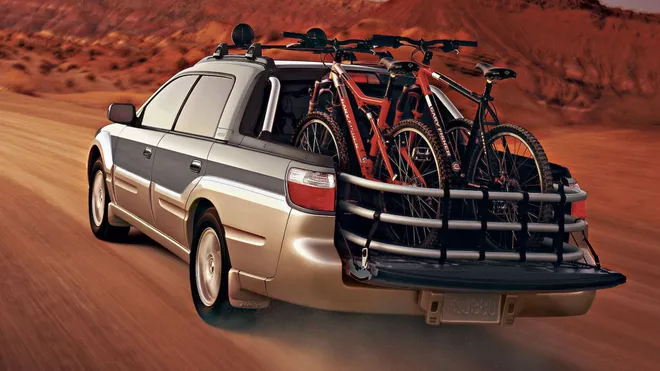
Subaru Baja
Like everyone else in the 2000s, Subaru decided to try its hand at a cargo carrier. The Baja shared a platform, wheelbase, and much of its interior with the second-generation Outback, but the pickup variant was arguably less practical than its station wagon sibling. The cargo bed wasn’t even 3.5 feet long, and although the rear seats folded to extend that length a bit, the bulkhead and rear glass remained stationary.
The Baja was also ugly as sin, with an extended rear overhang that made it look like a duck-billed platypus. Its sheer weirdness has made the Subaru pickup somewhat collectible, and the automaker did offer it with the turbocharged 2.5-liter flat-four that shared a lot with the WRX STI. But the Baja is arguably both less attractive and less practical than just about any other pickup in history.
- Years Built: 2003–2006
- Why It’s Cool: Optional turbo powertrain
- Why It’s Not: Dopey styling, tiny bed
- Value Today: $6,000–$20,000
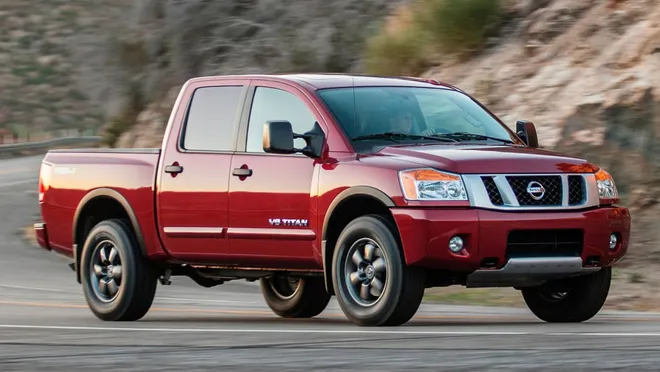
Nissan Titan
Nissan’s first attempt at a full-size pickup had a lot going for it. The Titan came standard with a burly V-8 that made 317 hp, it had optional locking storage bins in the bedsides, and the crew cab model had a spacious cabin and roll-down rear window that made it feel very airy for a truck. It also had extremely bold styling for the era, with a sloping hoodline, angular headlights and an arching roof that flew in the face of conventional truck design. The first-gen Titan is a cool truck, but the looks certainly aren’t for everyone.
- Years Built: 2004–2015
- Why It’s Cool: Standard V-8, novel storage features
- Why It’s Not: Alien styling
- Value Today: $8,000–$20,000
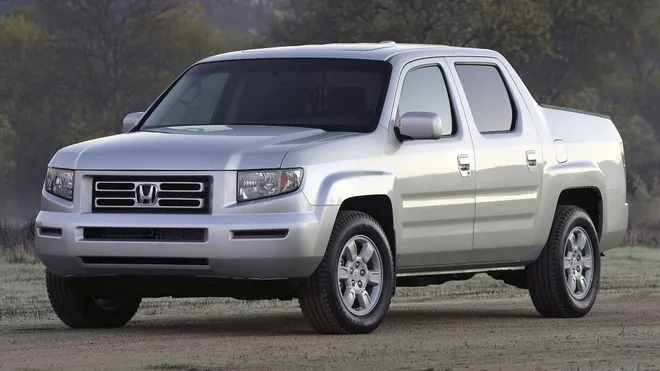
Honda Ridgeline
Honda is known for clever engineering solutions, and the first-generation Ridgeline came stuffed with them. The company’s first truck in the U.S. had a locking, waterproof trunk in the bed floor, as well as a tailgate that either flipped down or swung out for easier cargo loading. Based on the Pilot SUV, the Ridgeline also had a spacious, five-passenger interior. Unfortunately, the rectilinear front end and flying buttress bedsides made the Honda look like an imitation Chevy Avalanche, and if you’re gonna copy any truck design, why would it be that one?
- Years Built: 2006–2014
- Why It’s Cool: Waterproof in-bed trunk, dual-action tailgate
- Why It’s Not: Styling by Lego
- Value Today: $6,000–$13,000
Electric luxury cars:The first Ferrari EV is coming in 2026. Here’s what we know
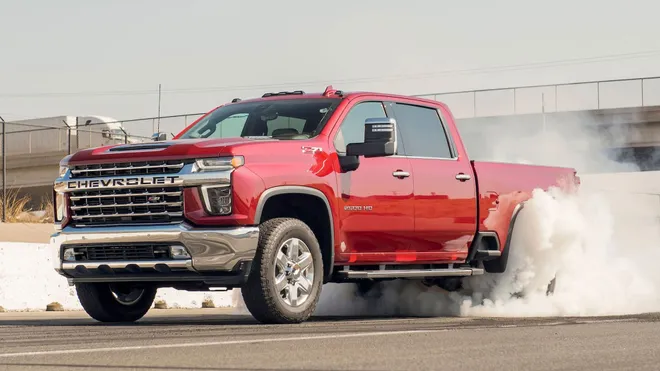
Chevrolet Silverado HD
Modern vehicles are bigger than ever, and nowhere is that more evident than full-size trucks. One of the most egregious offenders is the current Chevrolet Silverado HD, whose flat, bluff front end towers over the road — and most other cars. Chevy face-lifted some of the ugly out for the 2024 model year, but the 2020–2023 models not only blocked your view, but they did also it with some seriously unattractive styling. The trapezoidal front grille and split headlights looked insectoid, and the weird side mirrors look like that old Microsoft screen saver with the pipes.
- Years Built: 2020–2023
- Why It’s Cool: Husky Duramax diesel
- Why It’s Not: Pedestrian-smushing styling
- Value Today: $30,000–$60,000
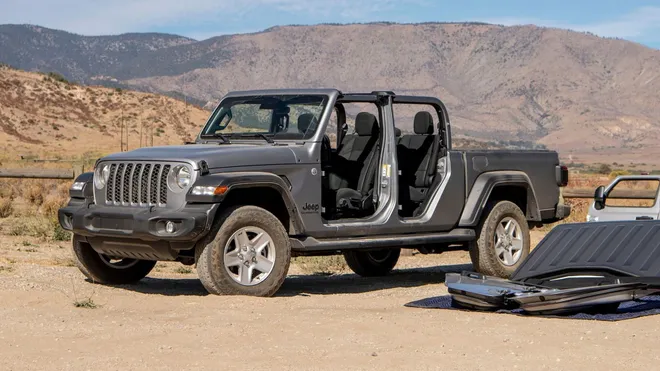
Jeep Gladiator Sport
Not all Jeep Gladiators are created equal. Where the Mojave and Rubicon trims have aggressive, trail-ready styling, the base Sport model looks about as long, low and flat as an aircraft carrier. The base Wrangler suspension does the lengthened Gladiator no favors, so unless you absolutely need the 7,700-pound towing capacity that’s only offered on the Sport S model, go taller (for looks if nothing else).
- Years Built: 2020–present
- Why It’s Cool: Great off-road, removable roof and doors
- Why It’s Not: Looks as long and flat as an aircraft carrier
- Value Today: $25,000–$35,000
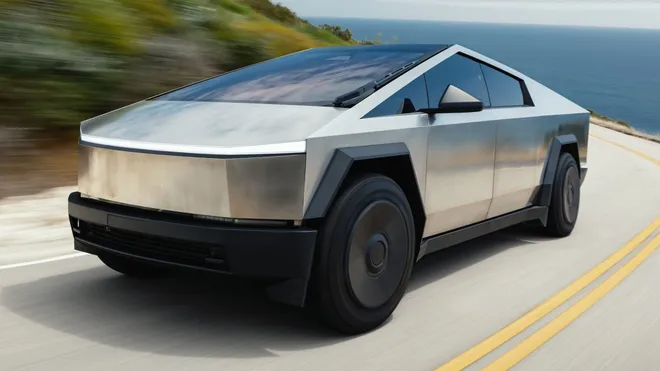
Tesla Cybertruck
The iconoclastic Tesla Cybertruck looks like nothing else on the road, and the automaker deserves some credit for livening up traffic with a novel design. Still, the Cybertruck doesn’t do anything convincingly better than the much more conventional Chevrolet Silverado EV and Ford F-150 Lightning, while its stainless-steel skin attracts fingerprints as competently as its sharp edges break fingers. It’s different merely for the sake of being different, and nothing is as unattractive as that.
- Years Built: 2024–present
- Why It’s Cool: Mold-breaking design
- Why It’s Not: Finger-breaking design
- Value Today: $60,000–$100,000
Photos by MotorTrend archive, Bring A Trailer, Ryan Lugo

